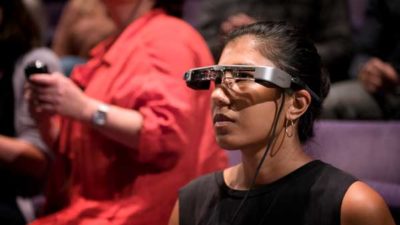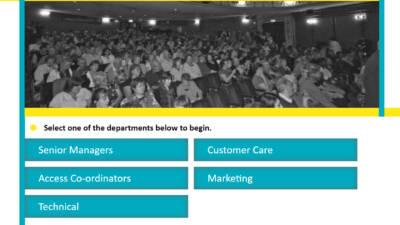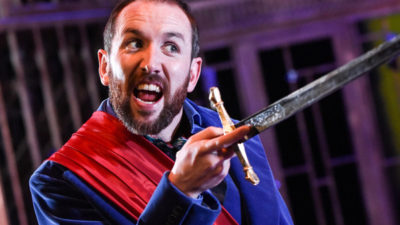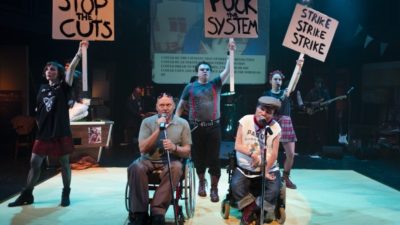Stagetext is a national charity which captions and live subtitles in theatres and cultural venues, enabling access to the arts for deaf, deafened and hard of hearing audiences. Melanie Sharpe, the organisation’s CEO explains the differences between the two and shares some of the exciting recent innovations in the field.
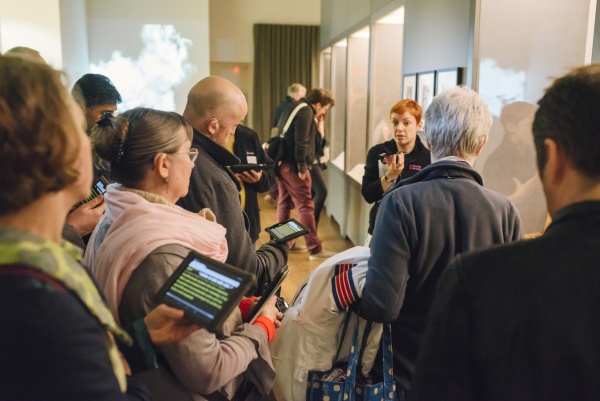
Our organisation was founded in 2000 by three deaf theatregoers, frustrated by the lack of access to theatre performances. They discovered captioning technology being used on Broadway and set up Stagetext to introduce the service in the UK. We’ve flourished ever since, presently captioning and live subtitling over 400 events around the country each year, as well as supporting venues to caption independently. Despite this, we’re aware of the challenge and importance of staying at the forefront of technical innovation, alongside the necessity in keeping quality access experiences at the heart of everything we do.
With a population that’s living longer and more people experiencing hearing loss in later life, learning sign language can be challenging, which is why text based access can open up the arts to many more people with varying degrees of hearing loss. For scripted performances in the theatre, we provide a captioning service, where the actors’ words are displayed openly on screens at the same time as they are spoken or sung. Captions are outputted live by a trained captioner who spends many hours of work preparing the script beforehand, so that the captions match the performance meticulously, ensuring our users get full access to a production.
‘One thing’s for sure, Stagetext changed my life, allowing me to fully understand what I saw at the theatre’
– Michelle Hedley, caption user.
For unscripted talks in cultural venues, we use live subtitling. A speech-to-text reporter (STTR) transcribes every word a speaker says using a special electronic shorthand keyboard which allows them to type phonetically (how words sound rather than how they are spelt). The words are then immediately converted back into English text by a computer software program, enabling the STTR to keep up with the speed of spoken English.
Technical breakthroughs have also enabled us to provide live subtitles on handheld tablets for tours in museums, galleries and in non-traditional outdoor spaces, such as The Canal & River Trust’s recent tour of Kentish Town Lock. Through the use of subtitling software together with mifi, a portable broadband device allowing multiple users to share an internet connection, customers could move around the 200 year old drained lock with a handheld tablet and read along in real time as the tour leader spoke of the site’s history. Customers could even wander away from the tour group to explore further, still being able to follow exactly what the speaker was saying.
‘Did not miss a word of guided tour of Kentish Town Lock. Thanks to Stagetext for accurate live subtitles. Fascinating.’
– Dawn Jones, caption user.
Furthermore, we’ve recently established a Digital department to caption National Theatre Live encore broadcasts in cinemas, plus an impressive range of Digital Theatre productions, in addition to training venues in how to subtitle their online content in-house, including trailers.
‘Thank you Stagetext for our fantastic (Digital) Subtitling Workshop yesterday. We are now able to subtitle all our YouTube videos in house.’
– English Touring Theatre.
Whilst technology will continue to develop, we aim to lead the way in bringing this innovation to life in an accessible way, making as many arts events as possible open to deaf, deafened and hard of hearing audiences, as well as people who miss a word here and there because they may not hear as well as they used to.
From 14 to 19 November 2016, Stagetext is organising its second Captioning Awareness Week to raise the profile of captioning amongst arts venues and culture lovers. To learn how you can get involved in the week, or for captioned and live subtitled event listings, please visit our website.
For advice on the best captioning/live subtitling solution available for your organisation or event, please don’t hesitate to contact us.


